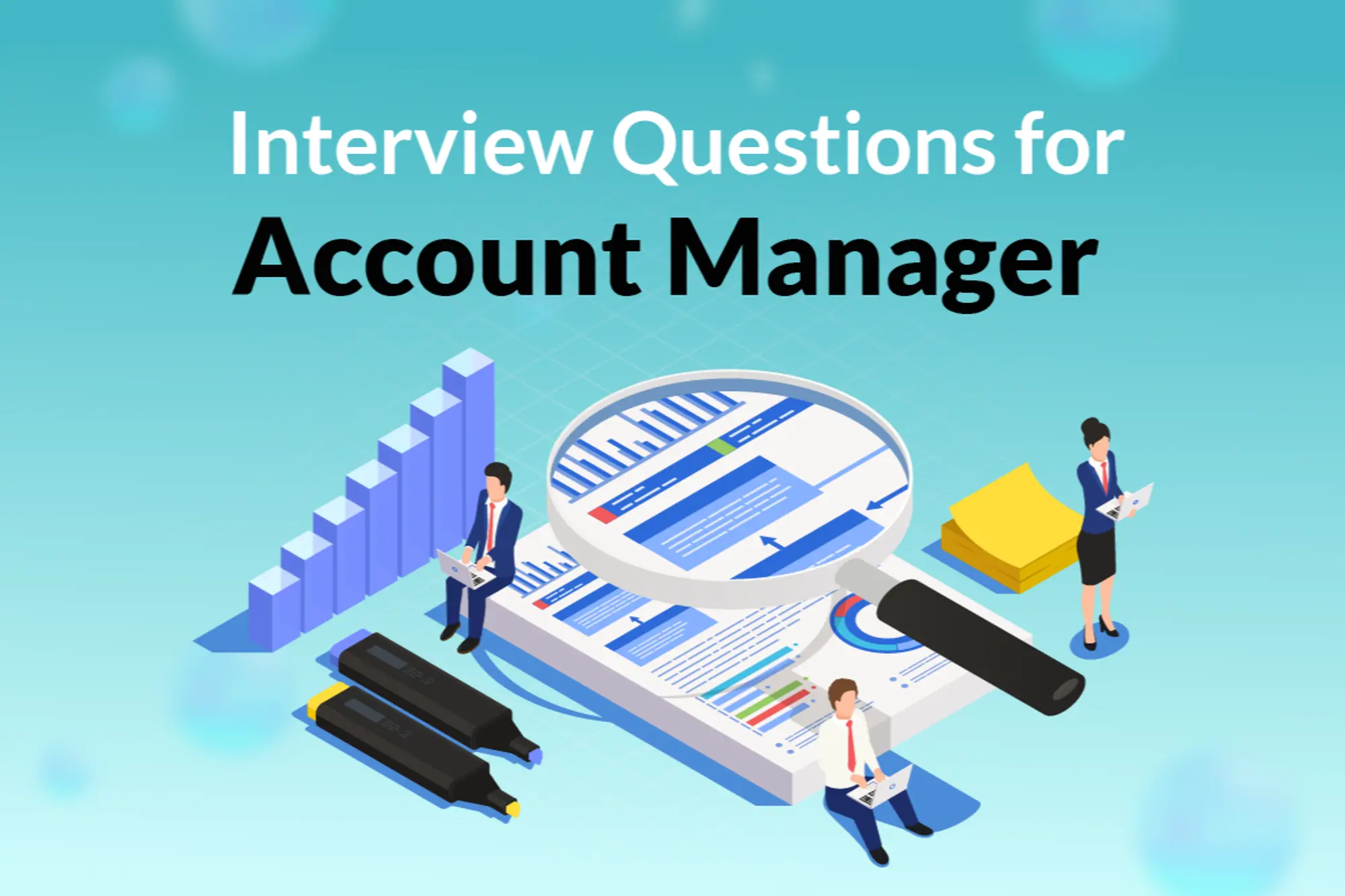Account Manager is a position that lies behind any sales and customer service team, taking its roots exclusively in marketing agencies. However, their The Account Manager’s scope has significantly broadened over time, supporting since they aid the business in meeting targets and building relationships that transform one-time clients into long-term partners. Today, there is a high demand for Account Managers across various industries, even in virtual jobs.
We will offer valuable insights into identifying candidates’ problem-solving skills, adaptability, and strategic thinking in client management. With the interview questions for account managers listed here, the interviewees can also identify and familiarize themselves with the main strategy for each question, giving them a leg up on the competition, lighting them years ahead of other candidates they’re competing with.
If you’re on the journey to either step into the role or looking to hire an Account Manager, you’re in the right place.
- General Interview Questions for an Account Manager
- Industry-Specific Questions
- Behavioral Questions
- Client Relationship Management
- Time Management and Prioritization Questions
- Multi-tasking Capability Questions
- Leadership and Mentoring Questions
- Future Vision for Account Management Questions
- Key Interview Questions and Insights
General Interview Questions for an Account Manager
According to OHSU, approximately 80% of interviews begin with what seems like a simple question. Many candidates, caught off guard, often delve into lengthy personal stories or recount their entire work history, a risky move that can reduce their chances.
In this section, we’ll explore a set of universal questions to unveil the skills and qualities necessary for any successful Account Manager. Such questions aim to reveal insights about a candidate’s alignment with the essential duties and expectations of the role.

1. Why are you interested in this position?
For Interviewers: It helps gauge a candidate’s genuine interest in the account manager role, separating those who are well-prepared and qualified from those who may lack enthusiasm or understanding.
Best Answer for Interviewees: Mention similar roles you’ve held in the past or internships from your resume. If you’ve worked in sales, customer service, or managed teams, emphasize these as they align well with the customer service focus of an account manager.
2. What are the main duties and responsibilities of an account manager?
For Interviewers: Help to distinguish whether a candidate truly understands the core tasks associated with the role of an account manager.
Best Answer for Interviewees: In response, you should be able to provide a clear and concise overview of the central responsibilities of an account manager. Tasks such as nurturing client relationships, achieving sales targets, ensuring client satisfaction, and maintaining effective communication should be mentioned.
3. Why did you choose to pursue a career in account management?
For Interviewers: An interviewer needs to know the candidate’s motivation and passion for the account management role to identify those genuinely committed to this career path.
Best Response for Interviewees: You should explain your authentic motivation for selecting a career in account management. Share what drew you to this field, whether it’s your passion for cultivating client relationships, creative problem-solving, or impactful experiences that influenced your career choice.
4. What are the most important skills and qualities of an account manager?
For Interviewers: Aim to understand the candidate’s self-assessment process and their dedication to achieving objectives in the account manager role.
Best Response for Interviewees: To provide a strong answer, describe the specific metrics, KPIs (Key Performance Indicators), or strategies you utilize to assess your effectiveness in account management. Offer examples where you’ve met or exceeded goals, highlighting your continuous commitment to improvement.
5. How do you measure your performance and success as an account manager?
For Interviewers: Help to look beyond basic sales figures and KPIs regarding the account manager’s position, such as assessing client relationships, communication strategies, adaptability, and continuous personal development. Because it offers insight into the candidate’s understanding of what success looks like in this position and their approach to continuous improvement.
Best Response for Interviewees: Focus on client satisfaction and how you gather regular feedback, emphasizing how this directly informs your understanding of client needs and shapes your approach. Also, explain how this feedback helps you align with team objectives, enhance collaborative efforts, and refine your leadership skills.
6. What are some of the challenges or difficulties that you have faced or anticipate facing as an account manager?
For Interviewers: In the account manager role, various challenges and difficulties can arise from internal and external factors. Therefore, being aware of these potentials identifies effective problem-solving and strategy development.
Best Response for Interviewees: A strong response should succinctly outline key challenges such as managing client expectations, adapting to market changes, coordinating with internal teams, client retention, and personal time management.
Industry-Specific Questions
Industry-specific questions during job interviews are key to evaluating a candidate’s knowledge and experience in a particular field. They aim to explore the candidate’s familiarity with the industry’s unique trends, challenges, and methodologies, thus shedding light on their potential to effectively operate and contribute to that environment.
1. What are some of the current trends and developments in your industry?
For Interviewers: Ask this to see if candidates are keeping pace with the thriving industry. It’s a way to check their ability to incorporate new trends and developments into their work.

For Interviewees: Focus on the latest changes in your industry, such as new technologies, market shifts, or evolving consumer behaviors. Discuss how these trends impact your role and the broader industry, showcasing your ability to stay current and relevant.
2. How do you keep yourself updated on your industry’s latest news and information?
For Interviewers: This explores the candidate’s dedication to ongoing learning and professional growth.
For Interviewees: Talk about your strategies for keeping up-to-date, like following industry leaders on social media, attending webinars, or reading trade publications. It’s important to show a structured approach to continuous learning.
3. How do you research and identify potential clients in your industry?
For Interviewers: Use this to understand how the candidate approaches market analysis and client prospecting, both key aspects of business development.
For Interviewees: Explain your methods for client research, such as analyzing market data, attending industry events, or developing social media.
4. How do you tailor your approach and strategy to different types of clients in your industry?
For Interviewers: This question helps gauge how well a candidate adapts their methods to suit various client profiles, which is vital for effective client management.
For Interviewees: Describe how you adjust your approach for different clients. Include examples where you’ve customized communication styles or service plans to meet specific client needs better, illustrating flexibility and a client-focused approach.
5. What are some of the common challenges or issues that clients in your industry face?
For Interviewers: Aiming to uncover the candidate’s awareness of the client’s perspective and the types of problems they are adept at solving.
For Interviewees: Discuss common issues clients face in your field, such as adapting to new technology or managing regulatory changes. Share how you address these issues, demonstrating your ability to understand and solve client problems.
Behavioral Questions
You can gain insight into how candidates have handled situations in the past, which can predict how they might perform in similar scenarios at your company. These questions often start with phrases like “Tell me about a time when…” or “Give an example of how you…”, prompting candidates to share specific, detailed stories from their professional experiences.

1. Tell me about a time when you successfully acquired a new client. How did you approach them and convince them to work with you?
For Interviewers: Consider how the candidate talks about engaging new clients. Hearing about their unique approaches to understanding and meeting specific client needs is insightful.
For Interviewees: When discussing landing a new client, focus on your unique approach. How did you get to know their business, and what personalized strategies did you use? Share the story of how you built this relationship and the success that followed.
2. Tell me about a time when you dealt with a difficult or unhappy client. How did you handle the situation and resolve the issue?
For Interviewers: Look for the candidate’s ability to turn challenging situations around. How do they navigate these tricky waters while keeping client relationships healthy?
For Interviewees: Choose a tough client situation and dive into how you handled it. Share your strategy for understanding their concerns and how you creatively solved the issue, keeping the relationship intact.
3. Tell me about a time when you had to upsell or cross-sell a product or service to a client. How did you identify the opportunity and persuade the client?
For Interviewers: Assess the candidate’s skills for spotting and acting on upselling opportunities. How do they align these opportunities with the client’s needs?
For Interviewees: Share a story where you saw an upsell or cross-sell chance. Explain how you understood the client’s deeper needs and successfully pitched your idea, creating a win-win situation.
4. Tell me about a time when you had to manage multiple accounts or projects simultaneously. How did you prioritize and organize your tasks?
For Interviewers: Focus on how the candidate keeps their cool and stays organized with multiple balls in the air. How do they ensure nothing falls through the cracks?
For Interviewees: Describe juggling several projects or accounts. What systems or methods did you use to stay on top of everything? Highlight how your approach led to successful outcomes across the board.
Client Relationship Management
An Account Manager acts as a bridge between the client and the company, ensuring the client’s needs are met while aligning with the company’s goals.
Therefore, they need to anticipate client concerns, proactively address issues, and identify opportunities for growth and collaboration, thereby strengthening the client-company relationship over time.

1. How do you establish relationships and trust with new and existing clients?
For Interviewers: Explore the candidate’s techniques for forging strong connections with new and existing clients, uncovering how they use interpersonal skills and trust-building strategies to develop client relationships.
For Interviewees: Highlight your methods for connecting with clients, focusing on how you listen to their needs, showcase your expertise, and consistently meet commitments.
2. How do you communicate and interact with clients regularly? What tools or methods do you use?
For Interviewers: Dive into the candidate’s daily communication practices with clients, including the tools and frequency of contact, and reveal their approach to maintaining ongoing, effective client engagement.
For Interviewees: Outline your regular communication channels and techniques with clients, such as using email, phone calls, or digital platforms. Emphasize the importance of being accessible, responsive, and clear in all communications to nurture positive client interactions.
3. How do you collect and use client feedback to improve your service and performance?
For Interviewers: Find out how the candidate integrates client feedback into their service improvement strategies. This shows their dedication to evolving based on client input.
For Interviewees: Describe your process for collecting and implementing client feedback. Share how you’ve used client insights to refine your services or enhance your performance, demonstrating a commitment to continual improvement.
4. How do you handle client complaints or requests? What steps do you take to ensure client satisfaction and retention?
For Interviewers: Consider this question important as it helps you understand the candidate’s approach to problem resolution and client satisfaction. It’s about assessing their skills in handling challenging situations and maintaining client loyalty.
For Interviewees: Share your strategy for dealing with client issues, detailing how you respond, engage, and solve problems. Focus on your ability to empathize, act quickly, and ensure solutions align with client expectations to maintain satisfaction and trust.
5. How do you recognize and reward loyal or valuable clients?
For Interviewers: Ask about the candidate’s methods for acknowledging and rewarding their most loyal and important clients.
For Interviewees: Discuss how you recognize and show appreciation to your key clients, like through customized communication, special offers, or exclusive events. Then, explain how these actions strengthen client relationships and foster long-term loyalty.
Time Management and Prioritization Questions
Asking about a candidate’s approach to time management and task prioritization sheds light on how they handle the complex demands of an account management role, where juggling various client needs and projects is a regular occurrence.

1. How do you plan and schedule your daily, weekly, or monthly activities and tasks as an account manager?
For Interviewers: Discovering how candidates plan their daily, weekly, or monthly tasks gives you insight into their organizational skills and long-term planning capabilities.
For Interviewees: Describe your method for organizing your workload. Whether it’s digital tools or traditional methods, explain how you organize your daily, weekly, and monthly tasks, showing you manage immediate duties without losing sight of longer-term goals.
2. How do you balance your workload and allocate your time and resources among different accounts or projects?
For Interviewers: It’s important to understand how candidates distribute their time across various projects or accounts, as this reflects on their capacity to handle diverse responsibilities.
For Interviewees: Share your strategy for managing time among different projects or clients. Explain how you prioritize tasks, focusing on urgent needs while maintaining steady progress on other fronts.
3. How do you handle urgent or unexpected requests or issues from clients or internal teams?
For Interviewers: Asking about their response to unexpected requests assesses a candidate’s flexibility and problem-solving under pressure.
For Interviewees: Discuss your method for handling urgent client requests or sudden internal team issues and how you quickly reassess your priorities and effectively realign your schedule to address these immediate needs, all while keeping other projects on track.
Multi-tasking Capability Questions
Multi-tasking is an art in account management where you’ll find out how to determine a candidate’s capacity to handle multiple tasks simultaneously without compromising quality or efficiency.
1. How do you monitor and track the progress and status of your accounts or projects?
For Interviewers: Asking about their tracking methods gives insight into their organizational strategies and how they keep up with the details of various accounts or projects.

For Interviewees: Discuss your techniques for monitoring different accounts or projects. Whether it’s using a CRM system, project management software, or a combination of digital and manual tools, explain how you keep everything on track and stay informed about progress.
2. How do you handle competing or conflicting priorities or demands from different clients or internal teams?
For Interviewers: Gain insight into the candidate’s ability to handle simultaneous requests or conflicting priorities from different sources, a common scenario in account management.
For Interviewees: Talk about your methods for handling conflicting priorities. Offer a real-life example to illustrate your process for assessing urgency and importance, making decisions, and maintaining clear communication with all involved parties.
3. How do you evaluate and measure the results and outcomes of your accounts or projects?
For Interviewers: It’s important to know how candidates determine the effectiveness of their accounts or projects, as this speaks to their analytical skills and understanding of success metrics.
For Interviewees: Talk about how you measure the results of your work. Highlight the specific KPIs or performance indicators you focus on and how you use these evaluations to refine your approach and drive improvements in future projects.
Leadership and Mentoring Questions
Exploring a candidate’s leadership and mentoring skills provides insight into their ability to inspire and guide others, as well as their potential to lead and their approach to developing the skills of their colleagues.
1. How do you lead and motivate your clients or internal teams to achieve their goals and objectives?
For Interviewers: Find out how the candidate encourages clients or team members to reach their objectives.

For Interviewees: Talk about your methods for inspiring and guiding clients or team members toward their goals. Tell them about your communication style, motivational techniques, and how you align individual efforts with broader objectives, emphasizing your leadership style and effectiveness.
2. How do you coach or mentor new or junior account managers or other staff members?
For Interviewers: Assessing the candidate’s approach to coaching or mentoring junior staff or new account managers can give you a sense of their commitment to team development and knowledge sharing.
For Interviewees: Describe your experience in coaching or mentoring others, such as sharing knowledge or encouraging professional growth, and how you tailor your mentoring style to meet individual needs, demonstrating your ability to foster talent within your team.
3. How do you handle or resolve conflicts or issues that may arise among your clients or internal teams?
For Interviewers: Getting a sense of how the candidate deals with internal or client-related conflicts, hence, evaluating their conflict resolution and negotiation skills.
For Interviewees: Share how you get to the heart of the issue, create open communication, and steer all parties towards a resolution. It’s also time to show your ability to keep the work environment positive and productive, even when facing challenges.
Future Vision for Account Management Questions
When assessing a candidate’s vision for the future of account management, focus on their ability to foresee and adapt to industry changes.
1. What are your short-term and long-term goals as an account manager?
For Interviewers: Having a clear understanding of candidates’ goals in their account management career offers insights into their planning and foresight and how they align their aspirations with the industry’s future.

For Interviewees: Prepare and discuss your immediate and future goals, highlighting how they align with the evolving nature of account management.
2. What are some of the trends or developments that you anticipate or foresee in the account management field?
For Interviewers: When asking about trends and developments in account management, you want to know the candidate’s awareness of the industry’s evolution and their ability to adapt to these changes, which reveals how forward-thinking and proactive they are in staying relevant in their field.
For Interviewees: In your response, discuss the emerging accounting management trends shaping the industry. Then, focus on technological advancements such as increased use of AI and automation for efficiency in repetitive tasks. Highlight the growing importance of cloud-based accounting solutions and integrated ERP systems, which are changing how account managers access and analyze data. Mention the shift towards data-driven decision-making processes, underlining the use of data analytics and forecasting tools. Also, note the evolving work environment, with a stable move towards remote and hybrid work models. Finally, touches on the changing client relationship dynamics, such as the trend from hourly billing to value-based models.
Key Interview Questions and Insights
In the fast-paced domain of account management, whether you’re conducting the interview or stepping into the spotlight as the interviewee, these questions are your guide will shed light on your way. They delve into behavior, future vision, and industry trends.
For interviewers, they provide a glimpse into a candidate’s experience, adaptability, and industry foresight. As for interviewees, they’ll help you stand out, serve as your moment to shine, showing your readiness for industry shifts.
Each component, from identifying behavioral questions to envisioning the future, holds its own significance. We trust with the interview questions for account managers we’ve shared, and Boulo’s support we hope you’ll feel empowered on your hiring journey. will empower you on this path. Boulo connects you with exceptional talent seamlessly aligned with your vision.
Now, it’s time to take action and . Explore simplify your hiring process your next opportunity by posting a Job on Boulo, and unlocking the potential for your organization’s growth potential.

